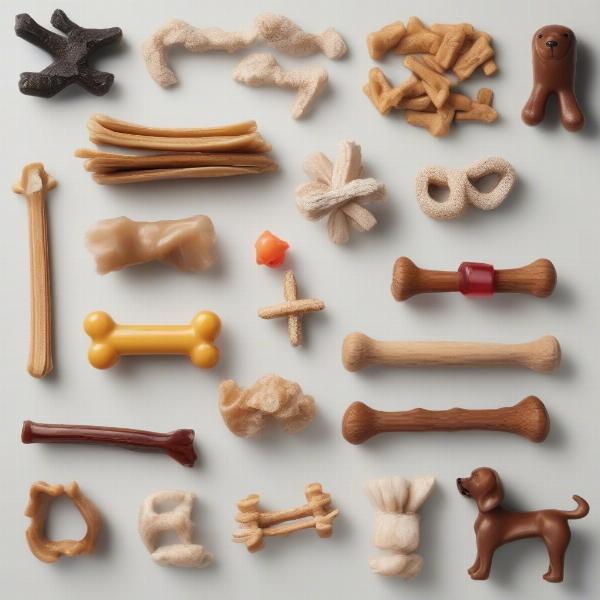Moon bones, often marketed as long-lasting chews for dogs, have gained popularity among pet owners. But are they a safe and healthy option for your furry friend? This guide will delve into the details of moon bones, exploring their composition, potential benefits and drawbacks, and offering practical advice to help you make informed decisions about whether or not to include them in your dog’s diet.
What Are Moon Bones Made Of?
Moon bones are typically made from pressed rawhide, often derived from cattle. The rawhide is cleaned, shaped, and dried to create a hard, chewable product. Some moon bones are flavored with beef, chicken, or other enticing tastes to appeal to dogs. However, the manufacturing process can sometimes involve harsh chemicals and preservatives, a factor that raises concerns about their safety. Understanding exactly what goes into a moon bone is crucial for assessing its suitability for your dog.
Potential Benefits of Moon Bones for Dogs
Proponents of moon bones often cite benefits such as dental health improvement and boredom relief. The act of chewing can help scrape away plaque and tartar buildup on a dog’s teeth, contributing to better oral hygiene. Additionally, the long-lasting chew can keep dogs occupied and mentally stimulated, reducing destructive behaviors born from boredom.
Potential Risks and Drawbacks of Moon Bones
Despite the potential benefits, moon bones come with several risks that pet owners should be aware of. One major concern is the potential for choking, especially for aggressive chewers who might break off and swallow large chunks. Digestive issues are another common problem, as rawhide can be difficult to digest and may cause blockages in the digestive tract. Some dogs may also experience allergic reactions to the rawhide or added flavorings.
“Always supervise your dog when they are chewing on a moon bone and remove it if it becomes too small or breaks into pieces,” advises Dr. Emily Carter, DVM, a veterinary specialist in canine nutrition. “Choosing the right size moon bone for your dog’s breed and chewing habits is also crucial.”
Alternatives to Moon Bones
If you’re looking for safer and healthier alternatives to moon bones, several options exist. Dental chews specifically designed for oral health are a good choice, as they often contain ingredients that promote healthy teeth and gums. Natural chews made from bully sticks, antlers, or sweet potato provide a long-lasting chew and are generally more digestible than rawhide. Interactive toys that dispense treats can also keep your dog entertained and mentally stimulated.
 Alternative Dog Chews
Alternative Dog Chews
Choosing the Right Chew for Your Dog
Selecting the right chew for your dog depends on several factors, including their size, age, chewing habits, and any allergies or sensitivities they may have. Always consult with your veterinarian before introducing new chews to your dog’s diet, especially if they have any underlying health conditions.
“Each dog is different, and what works for one might not work for another,” says Dr. Sarah Miller, a certified professional dog trainer. “Observing your dog’s chewing habits and consulting with a professional can help you find the best and safest chew options for their individual needs.”
Conclusion
Moon bones can provide some benefits for dogs, such as dental health improvement and boredom relief. However, they also pose potential risks, including choking, digestive issues, and allergic reactions. By carefully considering these factors and exploring safer alternatives, you can make the best decision for your dog’s health and well-being. Always prioritize your dog’s safety and consult with a veterinarian if you have any concerns.
FAQ
- Are moon bones digestible? No, moon bones made from rawhide are not easily digestible and can cause digestive problems in some dogs.
- Can puppies have moon bones? It’s generally not recommended to give moon bones to puppies, as they are more prone to choking and digestive issues.
- What should I do if my dog swallows a large piece of moon bone? Contact your veterinarian immediately if your dog swallows a large piece of moon bone, as it could cause a blockage in their digestive tract.
- Are there any safe alternatives to rawhide chews? Yes, there are several safe alternatives, including dental chews, bully sticks, antlers, and natural chews made from sweet potato or other digestible materials.
- How can I tell if my dog is allergic to a moon bone? Signs of an allergic reaction can include vomiting, diarrhea, itching, and swelling. If you notice any of these symptoms, discontinue use and contact your veterinarian.
- How often should I give my dog a moon bone? Moon bones should be given sparingly and always under supervision.
- Can moon bones help clean my dog’s teeth? While chewing can help scrape away some plaque and tartar, moon bones are not a substitute for regular brushing and professional dental cleanings.
ILM Dog is your one-stop resource for expert advice on all aspects of dog care and wellbeing. From breed selection to nutrition, training, and health care, we offer a wealth of information to help you provide the best possible care for your canine companion. We also offer a wide selection of premium dog products and accessories to enhance your dog’s life. For personalized guidance or to explore our products, contact us at [email protected] or call us at +44 20-3965-8624. ILM Dog is committed to helping you and your furry friend live a happy and healthy life together.